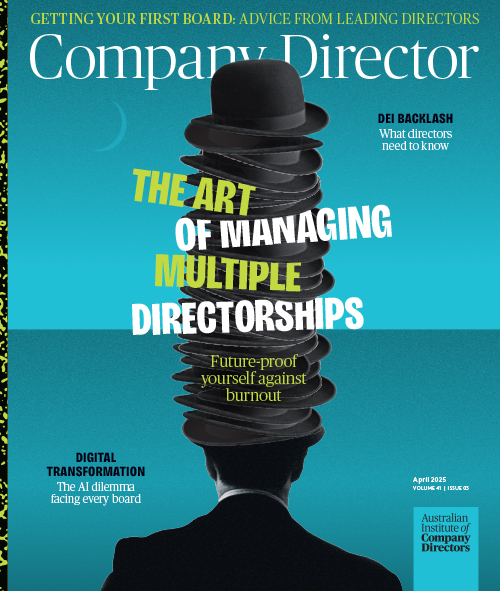For boards, understanding the intricacies of intangible assets is a rapidly changing frontier of risk and reward. Intangibles specialists Tim Heberden MAICD and Frances Drummond FAICD provide guidance on strategies for boards and management.
Spectrum of intangibles
Intangibles are the hidden gems of the corporate world, holding immense potential for differentiation and value creation. The diverse spectrum of intangibles encompasses brands, technology, databases and human capital. By understanding these assets, prioritising their governance and implementing effective strategies, boards and management can generate competitive advantage and unlock intangible value.
The first role of the board is to build awareness among themselves and key stakeholders of the most important intangible assets in their business. For each asset type there are fundamental commercial questions. How do they generate value? What are the main opportunities and risks? Is there robust intellectual property protection? How does your asset base compare to current and emerging competitors?
There is also a specific need to manage risks such as tax, reputation and litigation.
Governance challenges
Intangibles are typically more difficult to evaluate and manage than tangible assets. Challenges for boards and management include:
Identifying key intangibles: Most intangibles do not appear on balance sheets and asset registers, so identifying them and gauging their contribution to revenue and cost efficiencies can be complex.
Valuation and performance tracking: To prioritise board time and allocate resources, it is helpful to supplement non-financial performance measures with estimates of current and potential asset value.
Governance: Developing strategies to protect, leverage and grow intangible assets requires specific capabilities for brands, technology, data and other intangibles.
Considerations specific to social licence, data and tech value
Loss of social licence can seriously impact enterprise value. Tracking of brand equity and brand value provides boards with early warnings of brand vulnerability and supports the management of reputation risk and brand strategy.
Protecting data through cyber and risk strategies is on the agenda of many boards. This is not enough. Organisations should assess how to use data to improve customer experience, generate operating efficiencies and to address climate and sustainability concerns.
In addition to considering whether management has the appropriate range of capabilities, boards require reporting on data assets, data security and data strategy.
For many organisations, software and patented technology are highly valuable. However, due to the speed of advances in technology, board discussions should consider how long competitive advantage can be maintained, and also the R&D pipeline relative to current and emerging competitors.
Generating growth through an intangible-centric culture
In many industries, the importance of different types of intangibles has increased rapidly. Board reporting and board agendas have not always kept pace, nor have management capabilities. Persistently asking the right questions in board meetings can provide the catalyst for a culture that embraces the power of intangible assets to increase productivity and generate value.
Regular items on board agendas should include the performance, value and risk profile of brands, data, technology and other intangible assets — together with the implication of changes in stakeholder requirements and changes in the competitive landscape.
These discussions should not default to a risk focus. Business transformation relies on innovation — and innovation creates new intangible assets. Boards need to consider whether the fruits of innovation are being captured, protected and monetised. If internal capabilities are inadequate, thought should be given to targeted acquisitions and external collaboration.
Ascribing worth to the abstract
The term “intangible assets” covers a wide range of assets, including:
Technology and software: patents, trade marks, copyright and trade secrets.
Brand and reputation: trade marks and other aspects of brand identity, together with associated reputation or brand equity.
Data: information assets that can be analysed to generate insights, drive decision-making and be monetised.
Customer relationships: contracts and the trust and loyalty built with customers over time.
Human capital: the knowledge, skills and experience of employees.
Processes: the efficient and effective ways a company operates and
delivers value.
Tim Heberden MAICD and Frances Drummond FAICD are members of Deloitte’s IP Advisory team.
This article first appeared under the headline 'Intangible Value’ in the September 2024 issue of Company Director magazine.
Latest news
Already a member?
Login to view this content



